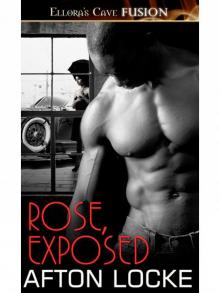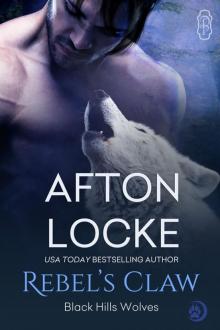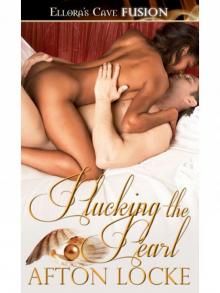- Home
- Afton Locke
PluckingthePearl
PluckingthePearl Read online
Plucking the Pearl
Afton Locke
When Pearl’s sheltered life shatters in the 1930s with her mother’s death, her only option is to move in with poor relatives and shuck oysters in the local plant on Oyster Island, Maryland.
Determined to live a morally proper life, the last thing she wants is an affair with a white man, but Caleb, the plant owner, knows a pearl when he sees one. The successful widower is the “oyster king” of the island, but his intense desire for his forbidden new employee, a woman of color, threatens everything he’s built.
What begins as a private sexual liaison flowers into strong feelings that don’t fit the social mores of the island. When their secret is discovered, they risk losing everything. They dared to pluck the pearl, but will their love be strong enough to keep it forever?
Ellora’s Cave Publishing
www.ellorascave.com
Plucking the Pearl
ISBN 9781419938993
ALL RIGHTS RESERVED
Plucking the Pearl Copyright © 2012 Afton Locke
Edited by April Chapman
Cover design by Dar Albert
Photography: OLJ Studios/Shutterstock.com
Electronic book publication February 2012
The terms Romantica® and Quickies® are registered trademarks of Ellora’s Cave Publishing.
With the exception of quotes used in reviews, this book may not be reproduced or used in whole or in part by any means existing without written permission from the publisher, Ellora’s Cave Publishing, Inc.® 1056 Home Avenue, Akron OH 44310-3502.
Warning: The unauthorized reproduction or distribution of this copyrighted work is illegal. No part of this book may be scanned, uploaded or distributed via the Internet or any other means, electronic or print, without the publisher’s permission. Criminal copyright infringement, including infringement without monetary gain, is investigated by the FBI and is punishable by up to 5 years in federal prison and a fine of $250,000. (http://www.fbi.gov/ipr/). Please purchase only authorized electronic or print editions and do not participate in or encourage the electronic piracy of copyrighted material. Your support of the author’s rights is appreciated.
This book is a work of fiction and any resemblance to persons, living or dead, or places, events or locales is purely coincidental. The characters are productions of the author’s imagination and used fictitiously.
The publisher and author(s) acknowledge the trademark status and trademark ownership of all trademarks, service marks and word marks mentioned in this book.
The publisher does not have any control over, and does not assume any responsibility for, author or third-party Web sites or their content.
Plucking the Pearl
Afton Locke
Dedication
This book is dedicated to the town that inspired it—Solomons Island, Maryland. Like many of you, I’ve been hit by the economy and had to majorly tighten the travel budget. Since I get most of my writing inspiration from trips, I was worried the creative well would run dry.
My husband suggested a day trip to Solomons, and I was pleasantly surprised by all the hidden jewels we found there—scenic waterfront, small-town festivals, delicious seafood and quaint shops. There’s even a one-footed seagull that insists on bussing outdoor restaurant tables.
Most importantly, it has interesting museums. In fact, when I walked into the historic oyster plant, the idea for this story came to me with such force I had to write it. Romance lives, even in hard times. That’s just as true today as it was during the Great Depression.
Acknowledgements
Thanks to all the wonderful authors at EC. More than once, I’ve called upon these ladies—most of whom I’ve met at RomantiCon™ conferences—to be a second pair of eyes for the books I write. Since this is my first foray into the Fusion line, I especially needed other input. Again and again, they generously give their time and feedback, making me a better author.
So thanks. You all know who you are!
Author Note
The setting, characters and events are purely fictional. I took some historical liberties, such as making the roads better than they would have been for that time and area. I also pretended the damaging 1933 hurricane had never happened.
Chapter One
Oyster Island, Maryland 1934
“This can’t be the right place.” Pearl Wilson blinked at the waterfront shack in front of her in disbelief.
Please, God, tell me this is not the right place. I can’t live here.
She sat in the small motorboat she’d hired at Oyster Island after getting off the steamboat from Baltimore. The boat driver, an old white man with tobacco-stained teeth, jabbed a finger at the slip of paper in her hand.
“It is according to that address there,” he said. “Now I haven’t got time to sit here all day while you make up your mind. Are you staying or going?”
While the boat engine idled, Pearl’s gaze grew hazy around the edges as she stared down at the address written in her mother’s careful hand. Oh, Mama. Why did you leave me?
She’s in a better place now, she reminded herself.
The name Johnson painted above the front door with faded letters removed any doubt about this being the wrong place.
Despite the tightness in her dry throat, she managed to utter, “I-I’m staying.”
What choice did she have? Although her father had abandoned her mother before Pearl was born and died not long after, his family was all she had now. She was about to throw herself upon the mercy of people she’d never met.
While the driver got her big suitcase from under the seat, she climbed out of the boat and looked at the cottage. Remnants of peeling paint revealed the small clapboard structure had once been turquoise. A stack of rusted crab pots covered one wall and a small rowboat was tied to a tree. Between two other trees, a sagging clothesline held garments that had seen better days.
The outhouse and lack of power lines made it clear the place had no electricity or running water. Her nose wrinkled from the scent of stale marsh mud. This was definitely not Annapolis…
The man all but threw her suitcase in the sandy dirt and stuck his hand out for his fare. She couldn’t help wondering if he would have helped her out of the boat and brought her luggage to the front door if she were white.
From her dress pocket, she pulled out the envelope of money her mother had given her before she’d died and gave most of it to the driver. Now that she’d completed her journey from Annapolis to Baltimore to Calvert County in southern Maryland, she only had a few pennies left.
The man grabbed the money from her and took off without as much as a word of thanks or farewell. A breeze, chilly and damp, blew in from the water and raised goose bumps on her arms.
She was about to wonder if anyone was home when the front door swung open, revealing a gaunt, broad-shouldered older woman in a patched-up, tan dress. Despite the tight bun at the back of her head, equal bits of black and white hair danced around her craggy, scowling face in the breeze.
Pearl’s heart dropped to her feet. This woman must be Aunt Wilma. What had she expected? Surely, she’d known her mother wouldn’t be standing there with her round-cheeked smile and generous curves.
The woman looked her up and down, taking in her blue jersey dress with lace collar, silk stockings and matching pigskin pumps, scowling even more.
“Who are you?”
Although her legs felt frozen in place, Pearl pushed herself forward and extended her hand. She cleared her throat, wondering if she would ever find her voice again. It was hard to compete with the gurgling of the creek and a tree full of noisy grackles roosting for the night.
“Pearl. Pearl Wilson, Randall’s daughter. Are you Wilma?”
The woman crossed her bony arms instead of shaking her hand. “Yes. What you wants with us?”
Pearl sighed. She’d known this wouldn’t be easy but didn’t kin mean anything to this hard-looking woman? Maybe she should have rubbed dirt all over her dress and arrived barefoot. Although her clothes were hand-me-downs from Annabelle Stuart, the daughter of her mother’s employer, they must’ve made her look like royalty in the eyes of this poor woman.
“My mother was a housekeeper in Annapolis. She…passed away.” Pearl had to struggle to keep her voice steady. Her loss was as recent as a fresh wound.
“Why didn’t you take her place?” Wilma asked.
“Our employer lost his home.”
Darn this awful Depression. If it hadn’t happened, she’d still have a home. Mama would still be alive…
Unable to look at her aunt’s forbidding face any longer, Pearl gazed at the creek. The setting sun brushed the water with molten orange.
She finally looked back at her aunt. “You see, I have no place else to go.”
“You got any money?”
Pearl shook her head. “I spent what little I had getting here.”
“Can’t afford no new mouth to feed,” the woman replied. “You should’ve found you a new job in Annapolis. You made the trip here for nothing.”
Panic mushroomed inside Pearl’s stomach, making her feel lightheaded. What kind of family didn’t take in one of its own? She’d tried to find another housekeeping job but times were so hard it seemed no one was hiring.
As she took a few steps toward the door, her high heels twisted in the unstable sand, nearly knocking her on her face. “Please, Aunt Wilma. I’ll work hard to earn my keep.”
In all her life, she’d never dreamed she’d one day find herself begging to live in a shack.
Wilma looked out over the water and back at Pearl. “It’s getting near dark. I reckon you can spend the night.”
“Thank you.” At least it was something. She was exhausted from traveling for hours. Tomorrow she would be rested and could figure out what to do more easily.
As soon as she stepped inside, the heel of her shoe went through a hole in the weathered floorboards. It was a far cry from the expensive rugs and polished parquet floors she was used to walking on.
Inside, the low-ceilinged cottage looked even smaller than it had from the outside. The tiny windows let in little light and an oil lamp burned from the corner while dampness covered her skin like a blanket. Several shelves lined the walls, filled with dusty, forgotten items.
Penetrating the heavy scent of grease from past cooked meals, a pot of beans bubbled on a cook stove of black iron. Pearl’s stomach rumbled, reminding her of how little she’d eaten today.
An ill-looking older man sat slumped in a rocking chair with a tattered quilt over his legs. He blinked in her direction.
“Who have we here?” he asked with a rusty-sounding voice.
“Everyone,” Wilma announced, “this is Pearl Wilson, Randall’s daughter. She’s traveled from ‘Napolis and is spending the night with us.”
“You sure are a pretty little thing. Come over here and let me get a better look at you,” the man said. “I’m your Uncle Charlie.”
Three others, all barefoot, entered from two small rooms in the back. She walked over to take the man’s extended hand, which was calloused and bent with rheumatism. His gesture of kindness nearly brought tears to eyes after what she’d been through recently.
Wilma introduced the others. “The older ones are your cousins, Leroy and Sadie. This here little one is Molly Bingham, the neighbor’s child. She likes to visit Charlie.”
Her cousins looked a bit younger than Pearl but not much. Molly looked no older than ten. All their clothes were faded and patched.
Pearl smiled at them. “It’s wonderful to meet you all.”
Although Leroy shot her a gap-toothed grin and Molly walked over to inspect her shoes, Sadie gazed at her with as much hostility as Wilma had. She even looked like a younger version of her mother.
Wilma turned her back to tend to the beans. No one invited Pearl to sit down or offered her any refreshment. No wonder her mother had never taken her to visit these rude people. Or were they cold because she never had visited? Thankful she had family and a place to stay, she took a deep breath, determined to make the best of things.
Molly ran a finger over the ankle strap of her shoe and looked up at her with big, dark eyes. “How come they’re so soft?”
“Because they were made that way,” Pearl replied.
“You talk funny.”
“That’s how educated folks talk, sweet pea,” Wilma told the girl.
Finally hearing some warmth in the woman’s voice surprised her. No matter how gruff she acted, at least she was capable of nurturing.
“I grew up in a household with a girl my age,” Pearl explained. “She had a tutor and I learned to read her books.”
“Well, weren’t you the lucky one,” Wilma said, sounding as hard as she had at first.
Molly peered into her face. “And your eyes are a funny color too.”
Pearl bit her lip. Her green eyes had attracted attention more than once. Now she wished they were brown so she’d look like everyone else.
“She must have some white blood in her,” Sadie remarked.
Wilma shot Pearl a glance that would have withered a plant. “It didn’t come from our side of the family.”
To Pearl’s knowledge, she was no more white than they were but didn’t see any point in debating it with them.
“Sit down, Pearl,” Charlie told her. “You look wore out. Sadie, get the girl some water.”
Pearl removed her gray cloche hat and sat at the small wooden plank table near the stove. Sadie dipped a battered tin cup into a bucket of well water and slapped it down in front of her without a word. To her relief, they shared their supper with her. Although the beans and hunk of cornbread didn’t compare to the fine chicken and fish she was used to eating in the Stuart household, it tasted wonderful.
If only the little girl would stop staring at her. Did she really look that unusual?
“You have fancy hair,” Molly said. “I seen pictures of film stars with hair like that.”
“Why, thank you,” Pearl replied. Although she’d worn it parted on the side and rolled up at ear level for over a year now, she wasn’t trying to look like a film star. Mama had just always taught her to look her best.
“Sounds like foolishness to me,” Wilma grumbled.
During the meal, Charlie asked her a lot of questions, coaxing her to reveal her dismal circumstances as she had to Wilma outside.
“Of course you’ll live with us,” Charlie said.
Wilma scowled as she stood and gathered the empty plates. “Can you shuck oysters, Pearl?”
She’d done a good deal of housekeeping work and cooking to help her mother, especially as the woman aged, but not this.
“No, Mr. Stuart always bought them already shucked,” she replied.
“That’s too bad,” the woman said, not sounding as if she cared what happened to her. “You could’ve gotten yourself a job at Rockfield’s.”
Pearl frowned. “What is Rockfield’s?”
“Rockfield Oyster House,” Leroy explained. “Me, Mama and Sadie work there shucking oysters.”
“It’s September, the start of the season,” Charlie said. “They’re bound to be hiring.”
“It’s not hard,” Leroy added. “I can teach you.”
She looked down at her hands, wondering if she’d ever have a chance to play a piano again. Would she even be able to after shucking oysters? It didn’t matter. Mama always said work came first.
“I’ll try,” she replied.
While Sadie placed the stack of dirty dishes in a basin of water, Wilma put her hand on Pearl’s shoulder, her hard fingers digging into muscle. It was the first time she’d touched her and it wasn’t kind.
“You try real hard tomorrow, girl, b
ecause the only way you can stay here is if you bring in that money.”
“Yes, ma’am.”
Charlie wiggled his bent fingers. “My oyster shucking days are over, I’m afraid.”
“He stays home and catches crabs,” Leroy told her.
“And a big fish once in a while if I’m lucky,” the old man added with a wheezy chuckle.
“You can sleep in Sadie’s room on a pallet,” Wilma said.
“Oh, Mama,” Sadie complained, glaring at Pearl. “There’s hardly any room back there as it is.”
“Do as I say, girl.” Wilma brushed crumbs off the table. “Pearl is kinfolk.”
Pearl knew it would be nothing like the room she and her mother had shared overlooking the Annapolis harbor. Closing her eyes, she could almost feel the soft cotton sheets of her twin bed and smell her mother’s powdery scent.
She only hoped sleep would take her quickly tonight so she could, at least for a few hours, escape the nightmare her life had become.
* * * * *
After riding in the Johnson’s wobbly rowboat over the choppy surf of the Patuxent River the next morning, Pearl was glad she hadn’t eaten much oatmeal at breakfast. Besides, Wilma didn’t look as if she wanted her to eat at all until she brought home some wages.
Leroy, who had done most of the paddling, tied the boat up at Oyster Harbor beside a bunch of others and helped the ladies out. It was so early it was barely light out. Pearl gazed at the heart of Oyster Island. A series of white clapboard buildings nearly faded altogether into the pearly-gray overcast sky. The fresh scent of the sea was stronger here than at the Johnson’s place on Crab Creek.
It was louder here too. A foghorn sounded as regularly as a heartbeat and water slapped the hulls of large boats. The road hummed with cars and trucks making deliveries. It reminded her of Annapolis, of home.

 Sadie's Surrender
Sadie's Surrender Hidden Moon
Hidden Moon Rose, Exposed
Rose, Exposed Alpha in Disguise
Alpha in Disguise Rebel's Claw
Rebel's Claw PluckingthePearl
PluckingthePearl Peak Energy
Peak Energy